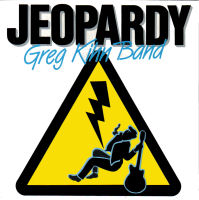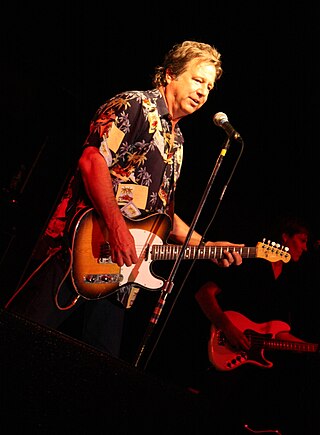
Gregory Stanley Kihn was an American rock musician, radio personality, and novelist. He founded and led the Greg Kihn Band and he wrote several popular horror novels. He is best known for the hits "The Breakup Song " in 1981 and "Jeopardy" in 1983.

"Weird Al" Yankovic in 3-D is the second studio album by the American parody musician "Weird Al" Yankovic, released on February 28, 1984, by Rock 'n Roll Records. The album was one of many produced by former McCoys guitarist Rick Derringer. Recorded between October and December 1983, the album was Yankovic's follow-up to his modestly successful debut LP, "Weird Al" Yankovic.

"The Safety Dance" is a song by Canadian new wave/synth-pop band Men Without Hats, released in Canada in 1982 as the second single from Rhythm of Youth. The song was written by lead singer Ivan Doroschuk after he had been ejected from a club for pogo dancing.

"Get Down Tonight" is a song released in 1975 on the self-titled album by the disco group KC and the Sunshine Band. The song became widely successful, becoming the first of their five No. 1 hits on the Billboard Hot 100. It also reached the top of the Hot Soul Singles chart and was an international chart hit, reaching No. 1 in Canada and charting in Australia, Belgium, the Netherlands, and the UK.

"Talking in Your Sleep" is a song by American rock band the Romantics. Released in September 1983, It became the band's most successful single in the US, reaching No. 3 on the Billboard Hot 100 in early 1984, being their only US Top 10 hit. The song would have a release two months later in Australia and New Zealand, a release later that year in Japan, and in January 1984 in the UK. It failed to chart in both countries. It became a UK hit in August that year for British group Bucks Fizz. The song is in natural minor.

"How Am I Supposed to Live Without You" is a song co-written in 1982 by Doug James and Michael Bolton. The track was originally recorded by Laura Branigan in 1983, charting at number one in both the US and Canadian Adult Contemporary charts. Bolton later recorded his own version of the song that topped the US Billboard Hot 100 and became a worldwide hit.

"No Matter What" is a song originally recorded by Badfinger for their album No Dice in 1970, written and sung by Pete Ham and produced by Mal Evans.

"Karma Chameleon" is a song by English band Culture Club, featured on the group's 1983 album Colour by Numbers. The single was released in the United Kingdom in September 1983 and became the second Culture Club single to reach the top of the UK singles chart, after "Do You Really Want to Hurt Me". The record stayed at number one for six weeks and became the UK's biggest-selling single of the year 1983, selling 955 000 copies according to the Official Charts Company. To date, it is the 38th-biggest-selling single of all time in the UK, selling over 1.52 million copies.
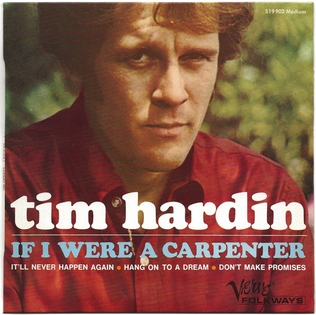
"If I Were a Carpenter" is a folk song written by Tim Hardin in the 1960s, and re-recorded with commercial success by various artists including Bobby Darin, The Four Tops and Johnny Cash. Hardin's own recording of the piece appeared on his 1967 album Tim Hardin 2. It was one of two songs from that release performed by Hardin at Woodstock in 1969. The song, believed by some to be about male romantic insecurity, is rumored to have been inspired by his love for actress Susan Morss, as well as the construction of Hardin's recording studio.

"We've Got Tonite" is a song written by American rock musician Bob Seger, from his album Stranger in Town (1978). The single record charted twice for Seger, and was developed from a prior song that he had written. Further versions charted in 1983 for Kenny Rogers as a duet with Sheena Easton, and again in 2002 for Ronan Keating.
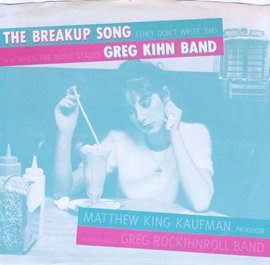
"The Breakup Song (They Don't Write 'Em)" is a song written by Greg Kihn and Steve Wright and recorded by the American rock band The Greg Kihn Band. It is the first single from the band's sixth studio album, RocKihnRoll (1981). The song's musical style encompasses pop rock and power pop.
"Don't Turn Around" is a popular song written by Albert Hammond and Diane Warren. It was originally recorded by American singer Tina Turner and released as the B-side to her 1986 hit single "Typical Male". It has since been included on Turner's compilation album The Collected Recordings: Sixties to Nineties (1994), as well as featuring in the Tina musical since 2018.

The Greg Kihn Band was an American band that was started by frontman Greg Kihn and bassist Steve Wright. Their most successful singles include "The Breakup Song " and "Jeopardy". The band's musical style and genres comprise rock, pop rock and power pop.
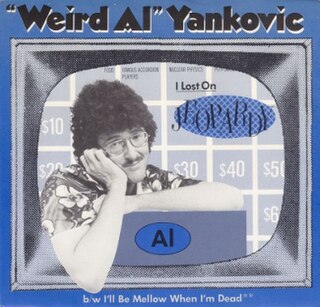
"I Lost on Jeopardy" is a song by American musician "Weird Al" Yankovic from his second album, "Weird Al" Yankovic in 3-D, released in 1984. The song is a parody of "Jeopardy" by The Greg Kihn Band, released in 1983, and its refrain "Our love's in jeopardy". The parody's lyrics center on the game show Jeopardy!, and features a guest vocal from Don Pardo, who announced for Jeopardy! from 1964 to 1975. The music video uses a set inspired by the game show, and in addition to Pardo, features cameos from the show's host Art Fleming as well as Dr. Demento and Greg Kihn. The song was released just prior to the revival of Jeopardy! in 1984, though contrary to popular theory, the revival was already in the works and was not inspired by Yankovic's song.

"I'm Your Boogie Man" is a song written and produced by Harry Wayne Casey and Richard Finch, and performed by Casey's band KC and the Sunshine Band, from their fourth album Part 3 (1976).

"Sowing the Seeds of Love" is a song by English pop rock band Tears for Fears. It was released in August 1989 as the first single from their third studio album, The Seeds of Love (1989).

"He Will Break Your Heart", is a song originally performed and co-written by Jerry Butler. It was a top-ten hit in 1960.

"How Much I Feel" is a 1978 song by American rock band Ambrosia. The song, written by the band's guitarist/vocalist David Pack, was released in the summer of 1978 as the lead single from their third album, Life Beyond L.A., peaking at position three on the Billboard Hot 100 chart and number two for three weeks on the Cash Box Top 100.
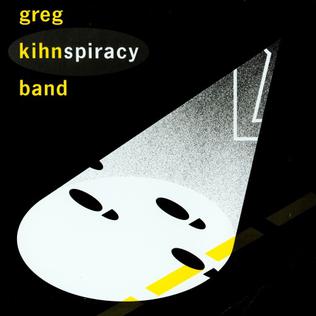
Kihnspiracy is a studio album by the Greg Kihn Band, released in 1983 by Beserkley Records. The album features the hit single "Jeopardy", the band's only top 10 hit on the Billboard Hot 100 singles chart. It reached number 2 in May 1983, beneath Michael Jackson's "Beat It". A parody of the song, "I Lost on Jeopardy", was released by "Weird Al" Yankovic in 1984.
"Mr. Sun, Mr. Moon" is a song by the American rock band Paul Revere & the Raiders written by Mark Lindsay originally released as a single in 1969, then on the album Hard 'N' Heavy later that year. The song peaked at number 18 on the Billboard Hot 100, number 15 on the Cash Box Top 100 Singles chart, and at number 8 on the RPM Top Singles chart.
